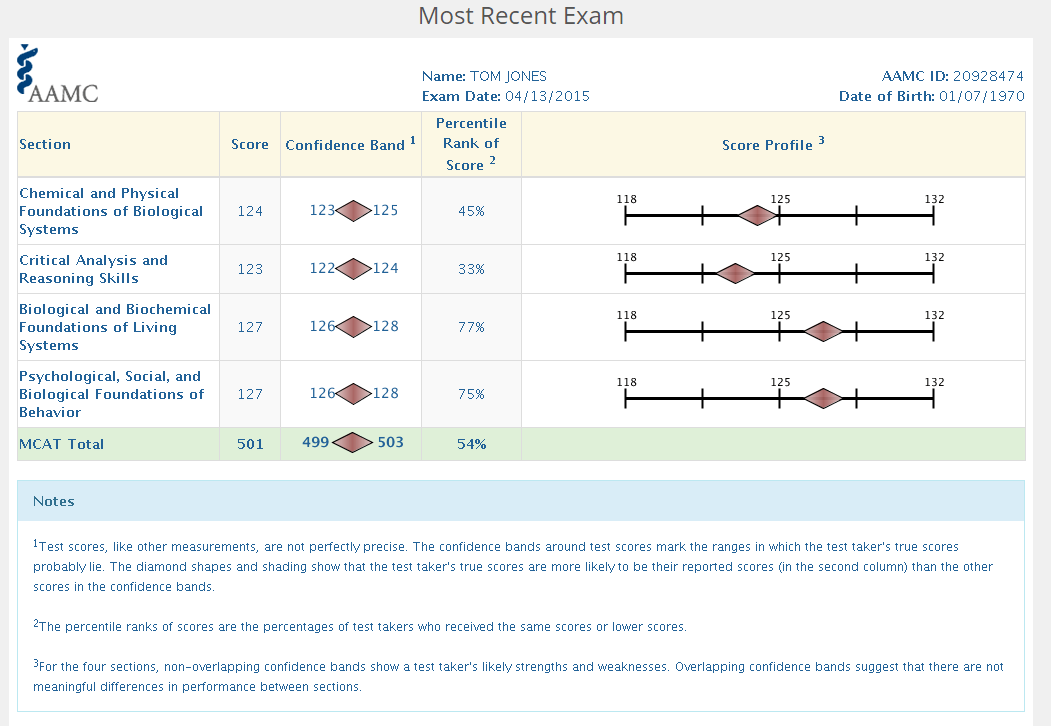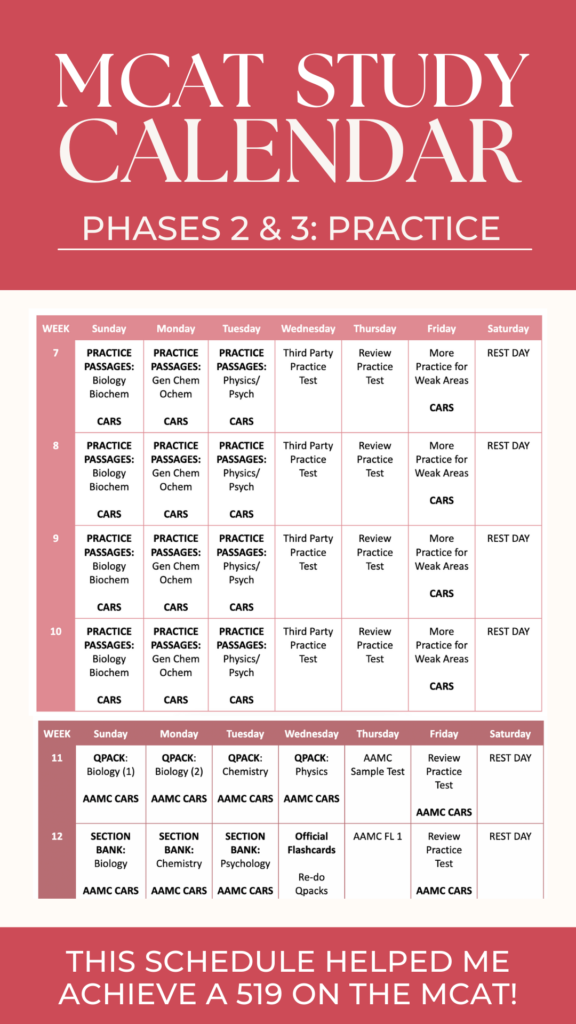Hi everyone! In today’s post, I am so excited to be sharing everything you need to know before studying for the MCAT. This is the first post in my MCAT series in which I will be answering some frequently asked questions about the MCAT. In my future posts, I plan on covering top MCAT study resources, study plans and strategies, and the mental health aspect of your MCAT journey.
The MCAT is an emotional rollercoaster that will push you to your limits. There will be times when you feel confused and alone; I know that I definitely experienced those emotions throughout my journey. I’m writing these guides to provide you with support and encouragement and to remind you that the MCAT is challenging but not impossible. If you ever have any questions on topics that my post doesn’t cover, feel free to email me at p31beauty@yahoo.com or DM me via Instagram (@p31beauty). I’m always here to help!
My MCAT Experience
Before we jump into the advice portion of the post, I do want to share my own MCAT experience. I decided to study for the MCAT after I graduated university in 2020 because I simply didn’t have enough time to study during undergrad. While working as a part-time research assistant, I studied for the MCAT from October 2020 to February 2021. During my practice tests leading up to the actual exam in March, I was reaching my target scores of around 516-518. I definitely felt like my studies had prepared me for the intellectual aspect of the exam, but throughout my journey, I failed to address something else that was incredibly important: my mental health.
On the night of my MCAT, I experienced test anxiety that recurred during the weeks leading up to the exam. I only got 3 hours of sleep… 3 hours of sleep for a 7 hour long test. I remember the moment I entered my car after the exam; I just started bawling my eyes out because I knew that my lack of sleep had affected my test performance. In April, my exam score came back and ended up to be a 507, which was 10 points less than what I was averaging on my practice tests.
It truly felt like the end of the world and all of the studying for the past few months had been for nothing. With time, I picked myself up and decided to sign up for a retake test a month later in May. During my one month of studying, I really made an effort to address my test anxiety and develop healthy sleeping habits. All of the months studying and time focused on my mental health eventually paid off because when I received my retake score back in June, I had managed to achieve a 519!
Before we begin, I want you to always remember these three things:
Everyone’s MCAT journey is unique, so don’t compare yourself or your score to others.
Your score does not define you or your ability to become a good physician. What matters is that you gave it your all.
Don’t underestimate the importance of your mental health. Your mind and body need a break too.
MCAT Introduction
What is the MCAT?
The MCAT is an entrance exam that prospective medical students are required to take in order to apply for medical school (in certain countries such as the U.S. and Canada). The test is broken up into 4 sections in the following order:
| SECTION | SUBJECT | # OF QUESTIONS | MINUTES |
| 1 | CHEMISTRY & PHYSICS (Chemistry includes general and organic chemistry) | 59 | 95 |
| 2 | CRITICAL ANALYSIS & REASONING SKILLS (CARS) | 53 | 90 |
| 3 | BIOLOGY & BIOCHEMISTRY | 59 | 95 |
| 4 | PSYCHOLOGY & SOCIOLOGY | 59 | 95 |
The total amount of time that you will be answering questions is 6 hours and 15 minutes. However, you will also have a tutorial, 10 minute breaks after sections 1 and 3, a 30 minute break after section 2, and an end of exam survey. So, the total amount of time that you will spend at the testing center is around 7 hours and 27 minutes. Here is a more realistic time table that incorporates the additional sections (source: Shemmassian):
| SECTION | SUBJECT | # OF QUESTIONS | MINUTES |
| TEST-DAY CERTIFICATION | 4 | ||
| TUTORIAL (optional) | 14 | ||
| 1 | CHEMISTRY & PHYSICS | 59 | 95 |
| BREAK (optional) | 10 | ||
| 2 | CRITICAL ANALYSIS & REASONING SKILLS (CARS) | 53 | 90 |
| BREAK (optional) | 30 | ||
| 3 | BIOLOGY & BIOCHEMISTRY | 59 | 95 |
| BREAK (optional) | 10 | ||
| 4 | PSYCHOLOGY & SOCIOLOGY | 59 | 95 |
| VOID QUESTION | 3 | ||
| END-OF-DAY SURVEY (optional) | 5 |
The MCAT will definitely be one of the most challenging exams you’ll ever take thus far. Not only does it test content that spans the entirety of what you’ve learned during your undergraduate years, but it is also very emotionally grueling. Because medical schools will be looking at your MCAT score, you’re going to want to do your very best. It will take a great deal of practice and preparation in order for you to make that happen. But don’t worry, you got this! I’ll be here to help you out every step of the way! 🙂
How are the questions formatted on the MCAT?
There are two types of questions on the MCAT: Passage-Based and Discrete Questions.
You can probably guess what passage-based questions are haha! You read a passage and then answer 4-7 questions related to that passage. Discrete questions are stand-alone questions that are not related to any passage. On all of the science sections, there are around 10 passages, 44 passage-related questions, and 15 discrete questions. On the CARS section, there are 9 passages, 53 passage-based questions, and no discrete questions.
How is the MCAT scored?
Each section of the MCAT is scored individually. First, your raw score is assigned to a percentile, which is then associated with a point system. The range of points that you can receive for a section are 118 (lowest) to 132 (highest).
For example, if you missed 0-1 questions on a section, then you were within the 100th percentile, so you would receive a perfect score of 132 for that section. Each section score is added to produce your overall MCAT score. Since there are 4 sections, the highest/maximum score that you can receive on the MCAT exam is 528 (4 sections x 132 = 528).
Here is an example of what an MCAT score report looks like (Source: Magoosh):

What score do you need on the MCAT?
Ideally, you would want to get the highest score possible, since that will increase the competitiveness of your medical school application. However, you should also be realistic. Not everyone has the ability to study full time, and study materials are very expensive, which can prevent people from purchasing them. Unfortunately, these factors can significantly affect one’s score; it’s really disappointing that money plays a role in one’s medical journey, but that is a story for a different time. Anyways, the first step to being realistic about the MCAT is to look up the MCAT averages for medical schools that you’re interested in. You should aim to score around those averages!
When do you receive your MCAT score?
You receive your MCAT score 1 month after your test date. After receiving your score, you can decide if you need to retake the test. You have a maximum of 3 tests that you can take within a calendar year, and a total of 7 tests within your lifetime.
Where do you take the MCAT?
The MCAT is administered at a Pearson Professional Center. The testing center has supervised exam rooms with computers that you use to take the test. Since there are many students who sign up for the MCAT and each center has limited capacity, you may have to travel to a distant location depending on the availability when you sign up for the test. It’s very important to sign up as early as possible!
How do you sign up for the MCAT?
First, create an AAMC account and then sign into the AAMC MCAT Registration System. As you can see in the AAMC calendar below, there are specific dates that you can take the MCAT each month. The AAMC website states, “Registration is open for January-June dates in 2022. Registration for dates in July-September will open on February 8 at noon ET.” (Source: AAMC)

Again, be sure to sign up for the MCAT as soon as registration opens because spots fill up extremely fast. I know people who have had to fly to a different location or even drive 3 hours to take the test. Obviously, you want to have as much rest as possible prior to your test, so try to sign up for a location nearest to you.




Studying for the MCAT
When should you take the MCAT?
I highly recommend that you take the MCAT after you’ve taken courses that cover most of the MCAT topics. Studying for the MCAT should feel like a review of everything you’ve learned in college. You should not have to learn most of the topics completely on your own from scratch. Now there is an exception to this; I actually never took a psychology or sociology course in high school or college. That was the one section that I had to self-study, but it was not as difficult as you’d think because it mostly required memorization. In addition, Khan Academy has a very comprehensive MCAT course that covers psychology and sociology; it helped me achieve a perfect score in this section on the actual exam!
Another piece of advice that I want to give you is: only take the MCAT when you feel ready. Okay I’ll admit that one never feels 100% ready for the MCAT, but you’ll know when you’re ready to take the exam when you start to achieve your target score on practice tests. If your test date is approaching and you’re not reaching your goal, I suggest that you postpone the test unless you are okay with where you’re currently scoring. The cost of one MCAT exam is around $325, so you want to minimize retakes as much as possible!
I also want you to keep medical school applications in mind. The application cycle opens at the end of May. If you want to know your MCAT score before you submit your applications, plan on taking the MCAT way beforehand. Scores are released one month after you take the exam, and you never know if you need to retake it. In addition, you want to also give yourself time to write quality essays for your application. If you take your exam in April or May, you may be so invested in studying for the MCAT that you might not have enough time to submit your application as early as possible. I took the exam in March of 2021 and also planned to apply to medical school that May. However, after receiving my score in April, I decided to retake the test in May. Let me tell you, I was scrambling to get all of my essays submitted on time because I only had two weeks after the MCAT to work on them. It was one of the most stressful times in my life, and I definitely wish that I had taken the MCAT earlier to account for these factors.
When should you start studying?
There are two types of studying when it comes to the MCAT: casual and serious!
Casually studying can be seen as reviewing MCAT topics or doing practice problems whenever you have free time during the school year. At this point, you’re not even signed up for the MCAT; you’re just trying to familiarize yourself with the material so that when the time comes to start grinding, you’ll already have had a head start. One of my regrets during my MCAT journey is that I didn’t start studying for it earlier while in undergrad! Remember, it’s never too early to start studying (as long as it’s not negatively affecting your grades/mental health).
If you want to casually study for the MCAT, I suggest that you go over subjects that you have to learn independently or subjects that you struggle with. So for example, during the school year, I wish that I had started self-studying psychology/sociology or practiced CARS since reading comprehension is one of my weak spots.
Seriously studying is when it’s time to get down to business in preparation for the exam, which you have already scheduled (or at least plan to). During this period, you should be following a study plan consistently and be prepared to take weekly practice exams as the test date approaches. The best time to start studying seriously is when you have as much free time as possible with minimal responsibilities. This will look different for everybody. Some people study full-time during the summer before senior year when they have no school or work. Others study during the school year when they are taking very few courses. And then there’s people like me that decided to study after graduating, while working part time. Studying for the MCAT can be challenging and emotionally exhausting, so it is best to ensure that there are minimal stressors in your life during this time.
How long should you study (seriously) for?
To know how long you should study for, you need to know the answer to two of the following questions:
How often do you plan on studying? (Are you going to study full-time or part-time?)
How much content do you already know?
If you plan on studying full-time, 3 to 4 months is usually enough time for people to feel ready. Many students study full-time during the summer of their junior year and take the test in September, so this time frame is very doable. After reviewing the topics covered on the MCAT and you feel as if you need to learn many topics independently, I would invest 4 or more months of studying instead of 3.
If you plan on studying part-time, 4 to 6 months is usually the time frame that I’ve seen most people follow, depending on how many hours a day you can study and how much content you need to review. For your reference, I studied for a total of 4-5 months while working part time after graduation. I worked around 10-15 hours a week and studied six days a week. On work days, I studied for around 4-5 hours, and on my days off I studied for around 8 hours. The only section that I needed to learn independently was psychology and sociology since I had never taken those courses in university. Again, it’s very important to create a study plan at the very start of your MCAT journey so that you know how to divide study content throughout the week. We’ll touch more on this in the next post. Like I mentioned earlier, if you feel as if you need to learn many topics independently, you may want to dedicate 6 or more months to studying.




CONCLUSION
I hope that this post helped familiarize you with the MCAT! Look out for my next few posts where we’ll dive into top MCAT resources and how to best study for the MCAT. If you ever have any questions, remember that you can always reach out to me via email, Instagram, or in the comments below! Best of luck with your studies! You got this!
MORE MCAT GUIDES
The Best MCAT Study Material That Helped Me Score a 519
MCAT Content Review Calendar and Study Schedule that Helped Me Score a 519 (FREE Download!)
Free MCAT Study Guide and Calendar That Helped Me Score a 519 (PART 2)
















